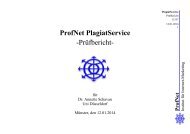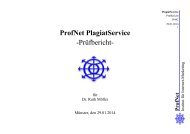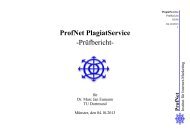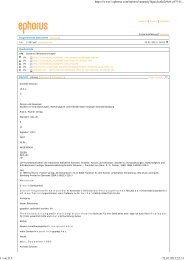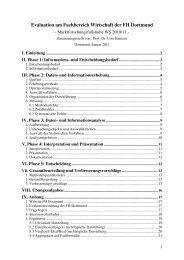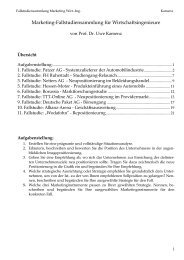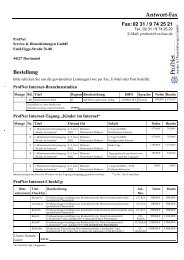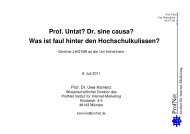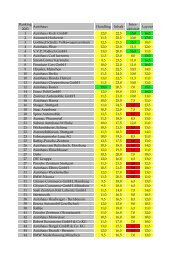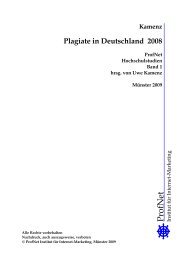https://www1.ephorus.com/reports/summary?dguid=a0a2e9a9-c87f ...
https://www1.ephorus.com/reports/summary?dguid=a0a2e9a9-c87f ...
https://www1.ephorus.com/reports/summary?dguid=a0a2e9a9-c87f ...
Erfolgreiche ePaper selbst erstellen
Machen Sie aus Ihren PDF Publikationen ein blätterbares Flipbook mit unserer einzigartigen Google optimierten e-Paper Software.
<strong>https</strong>://<strong>www1.ephorus</strong>.<strong>com</strong>/<strong>reports</strong>/<strong>summary</strong>?<strong>dguid=a0a2e9a9</strong>-<strong>c87f</strong>-41...<br />
103 von 215 22.01.2013 22:31<br />
D i e e i g e n t l i c h e Würde d e s<br />
Vernunftwesens<br />
liegt also nicht sondern darin,<br />
s c h o n begründet i n d e r p r a k t i s c h e n F r e i h e i t , daß e r d a s e i n z i g e Wesen i s t , verstanden wird. Das das a l s intelligible<br />
Subjekt<br />
Zweck a n s i c h s e l b s t s t e h t u n t e r dem d i e nur<br />
Anspruch a b s o l u t e r V e r b i n d l i c h k e i t .<br />
Seine moralische<br />
Grunderfahrung i s t d i e Erfahrung unbedingten S o l l e n s , M e n s c h l i c h e s Wollen, Vernunft sich S t r e b e n und H a n d e l n<br />
v o n d e r V e r n u n f t adäquat bewußt g e m a c h t w e r d e n k a n n . * ' i s t d a n n a l l e i n von d e r V e r n u n f t bestimmbar,<br />
"wenn d e r W i l l e i n Identität m i t d e r<br />
s e l b s t unabhängig v o n a l l e n Gegenständen d e s 2) Wollens das Gesetz g i b t . " D i e s i t t l i c h e Autonomie des i n t e l l i g i b l e n<br />
S u b j e k t s l i e g t i n d e r S e l b s t b i n d u n g a n das 3) 4) eigene Gesetz der Vernunft. D a r i n i s t d e r Mensch P e r s o n aus a l l e<br />
r Naturbestimmung herausgehoben, unbedingten Anspruch Bestimmung d e s des Sollens t r a n s z e n d e n t a l e I d e e d e r F r e i h e i t<br />
" umfaßt. transzendentalen und b i n d e t i h n a n e i n e Ordnung, daß e r u n t e r dem "Autonomie "Sie i s t Subjekts als s t e h t und<br />
(intelligiblen)<br />
d i e nur der Verstand<br />
1 ) "Das Bewußtsein d e r u n b e d i n g t e n V e r b i n d l i c h k e i t i s t e i n Faktum, a b e r k e i n e m p i r i s c h e s , s o n d e r n e i n<br />
Faktum d e r V e r n u n f t , und z w a r 'das e i n z i g e F a k t u m d e r r e i n e n V e r n u n f t ' " ( S c h w a r t l ä n d e r , J o h a n n e s :<br />
a.a.O. S . 1 2 3 ) . 2 ) B ö c k l e , F r a n z : a.a.O. S . 5 3 . 3) "Das k a n t i s c h e P r o b l e m d e r A u t o n o m i e a l s G e s e t z g e b u<br />
n g d e r V e r n u n f t bezüglich d e s B e g e h r e n s b e t r i f f t a l s o n i c h t d i e Wahlmöglichkeit d e s Menschen bezüglich v e r s c h i<br />
e d e n e r Begehrungsobjekte, b e t r i f f t auch n i c h t d i e v e r n u n f t g e l e i t e t e A b l e h n u n g bzw. B e v o r z u g u n g b e s t i<br />
m m t e r H a n d l u n g s z i e l e m i t R ü c k s i c h t a u f i h r e D u r c h f ü h r b a r k e i t , Nützlichkeit und S c h ä d l i c h k e i t . . . b e<br />
t r i f f t s c h l i e ß l i c h n i c h t ' p r a k t i s c h e ' Handlungsanweisungen zur R e a l i s i e r u n g e i n e s Z i e l s . . . , das k a n t i s c h<br />
e Problem d e r Autonomie i m p r a k t i s c h e n S i n n b e t r i f f t l e d i g l i c h d i e M ö g l i c h k e i t e i n e s W i l l e n s , bzw. einer<br />
reinen praktischen Vernunft" (Forschner,Maximilian: a.a.O. S . 1 9 5 ) . " D i e Wesen, d e r e n D a s e i n z w a r n i c h t a u f u n s e r e m<br />
W i l l e n , s o n d e r n d e r N a t u r b e r u h t , h a b e n d e n n o c h , wenn s i e v e r n u n f t l o s e Wesen s i n d , n u r e i n e n r e l a t<br />
i v e n W e r t , a l s M i t t e l , und heißen d a h e r S a c h e n , d a g e g e n v e r n ü n f t i g e Wesen P e r s o n e n genannt werden, w e i<br />
l i h r e Natur s i e schon a l s Zwecke a n s i c h s e l b s t , d . i . a l s e t w a s , d a s n i c h t bloß a l s M i t t e l g e b r a u c h t werden d a<br />
r f , a u s z e i c h n e t , m i t h i n s o f e r n a l l e W i l l k ü r e i n g e s c h r ä n k t (und e i n G e g e n s t a n d d e r<br />
4)<br />
167<br />
zu denken vermag." 6.3. Die Imperative<br />
D i e Zugehörigkeit d e s M e n s c h e n z u r n a t ü r l i c h e n ( e m p i r i s c h e n ) und z u r i n t e l l i g i b l e n des m e n s c h l i c h e n<br />
tischen (transzendentalen) W e l t führt i n d e n e t h i s c h e n U n t e r s u c h u n g e n K a n t s über d i e o b j e k t i v e n R e g e l n<br />
Handelns und z u r U n t e r s c h e i d u n g von hypothe2) kategorischen Imperativ.<br />
Imperativen d.h. sein Kant<br />
dem<br />
I m p e r a t i v e drücken g e n e r e l l e i n S o l l e n i n B e z u g a u f Handlungen a u s , unterlassen Hierbei Angenehme a u s als gut " s i<br />
e sagen, 3) würde." das Gute vom Angenehmen: oder j e n e s g i l t , Während d a s aber "nicht wird daß e t w a s z u t u n o d e r z u<br />
trennt<br />
"bloß s u b j e k t i v e n U r s a c h e n " d e n W i l l e n<br />
beeinflußt und n u r für d i e s e s<br />
P r i n z i p d e r V e r n u n f t " für j e d e r m a n n g e l t e n k a n n , Es b e s t i m m t den W i l l e n "mithin nicht aus<br />
das p r a k t i s c h Gute d u r c h d i e V o r s t e l l u n g e n d e r V e r n u n f t vermittelt. s u b j e k t i v e n Ursachen, sondern o b j e k t i<br />
v d . i . a u s Gründen, die 4)<br />
für j e d e s vernünftige Wesen a l s e i n s o l c h e s gültig s i n d . " Imperative g e b i e t e n nach Kant entweder h y p o t h e t i s c h oder<br />
kategorisch. man w i l l "Jene s t e l l e n die praktische ist, Notwendigkeit was zu e i n e r möglichen Handlung a l s M i t t e l z u e t w a s<br />
anderem,<br />
(oder doch möglich<br />
daß man e s w o l l e ) ,<br />
g e l a n g e n v o r . D e r k a t e g o r i s c h e I m p e r a t i v würde d e r s e i n , A c h t u n g i s t ) . D i e s s i n d a l s o n i c h t bloß s u b<br />
j e k t i v e Zwecke, d e r e n E x i s t e n z a l s W i r k u n g u n s e r e r H a n d l u n g für u n s e i n e n Wert h a t : s o n d e r n o b j e k t i<br />
v e Zwecke, d . i . D i n g e , d e r e n D a s e i n an s i c h s e l b s t Zweck i s t , und z w a r e i n s o l c h e r , a n d e s s e n S t a t t k e i n a<br />
n d e r e r Zweck g e s e t z t w e r d e n k a n n , dem s i e bloß a l s M i t t e l z u D i e n s t e n s t e h e n s o l l t e n , w e i l ohne d i e s e s<br />
überall g a r n i c h t von a b s o l u t e m W e r t e würde a n g e t r o f f e n w e r d e n ; wenn a b e r a l l e r W e r t b e d i n g t , m i t h i n<br />
zufällig w ä r e , s o könnte für d i e V e r n u n f t überall k e i n o b e r s t e s p r a k t i s c h e s P r i n z i p a n g e t r o f f e n werden"<br />
(Kant, Immanuel: G r u n d l e g u n g z u r M e t a p h y s i k d e r S i t t e n . S . 5 1 ) . 1) B ö c k l e , F r a n z : a.a.O. S. 5 3 . 2 ) v g l .<br />
zum f o l g e n d e n : S c h w a r t l ä n d e r , J o h a n n e s : a.a.O. S . 1 4 4 f f 3) Kant,Immanuel: 4) e b d . S. 3 3 . Grundlegung zur<br />
Metaphysik der S i t t e n . S. 3<br />
168<br />
w e l c h e r e i n e H a n d l u n g a l s für s i c h s e l b s t , auf einen anderen Die hypothetischen voraus, bezieht in bezug zu deren<br />
Handlungen angeben. also einen die Zweck, Imperative Das auf von die



